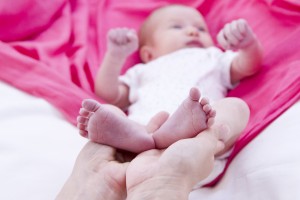 LONDON — The United Kingdom has become the first country in the world to approve the creation of what has been called “three parent babies”—a move that has has generated applause as an important health advancement while others have expressed concern about the ethical aspects of the practice.
LONDON — The United Kingdom has become the first country in the world to approve the creation of what has been called “three parent babies”—a move that has has generated applause as an important health advancement while others have expressed concern about the ethical aspects of the practice.
As previously reported, the practice involves in vitro fertilization (IVF), during which genetic material from the mother’s fertilized egg is transferred to the fertilized egg of a healthy donor that has had its nuclear DNA removed.
BBC News explains the first method: “Two eggs are fertilized with sperm, creating an embryo from the intended parents and another from the donors. The pronuclei, which contain genetic information, are removed from both embryos but only the parents’ are kept. A healthy embryo is created by adding the parents’ pronuclei to the donor embryo, which is finally implanted into the womb.”
The second method is similar.
“Eggs from a mother with damaged mitochondria and a donor with healthy mitochondria are collected. The majority of the genetic material is removed from both eggs. The mother’s genetic material is inserted into the donor egg, which can be fertilized by sperm.”
Therefore, the baby will contain the DNA of three people: the couple and their female donor.
The Wellcome Trust Centre for Mitochondrial Research, which is behind the studies for the technique, said that the “nuclear DNA is not altered, and so mitochondrial donation will not affect the child’s appearance, personality or any other features that make a person unique.” Rather, the purpose of the IVF procedure is to help prevent mitochondrial disease among infants, which can lead to serious problems such as heart disease, muscular distrophy or blindness.
U.K.’s Chief Medical Officer, Dr. Sally Davies, has also expressed support for efforts “to give women who carry severe mitochondrial disease the opportunity to have children without passing on devastating genetic disorders.”
But during the debate in the House of Commons, some expressed hesitation over the medical advancement as they were concerned that it may cross ethical lines.
“[This] will be passed down for generations, [and] the implications of this simply cannot be predicted,” member of parliament Fiona Bruce of Congleton told her colleagues. “But one thing is for sure, once this alteration has taken place, as someone has said, once the genie is out of the bottle, once these procedures that we’re asked to authorize today go ahead, there will be no going back for society.”
Religious groups in the country have also expressed opposition. Brendan McCarthy of the Church of England told CNN that he believed approval of the practice is premature.
“[T]he law should not be changed until there has been further scientific study and informed debate into the ethics, safety and efficacy of mitochondrial replacement therapy,” he said.
Roman Catholics in England have likewise noted that there are “serious ethical objections to this procedure which involves the destruction of human embryos as part of the process.”
UK House of Commons approved the IVF technique 382 to 128 earlier this month, sending the matter to the House of Lords for consideration. After three hours of debate on Tuesday, it voted 280 to 48 in favor of the practice.
“Sometimes we are accused of playing God. … We do not try to supplant God. We try to augment His works,” Lord Winston told reporters.
But Marcy Darnovsky, director of The Centre for Genetics and Society, referred to the move as a “historic mistake” that will “forever alter the human germline.”
“The techniques … are relatively crude and will not in and of themselves create so-called designer babies,” she said. “However, they will result in children with DNA from three different people in every cell of their bodies, which will impact a large range of traits in unknowable ways and introduce genetic changes that will be passed down to future generations.”
The first “three parent baby” could be born as early as next year.
Become a Christian News Network Supporter...


